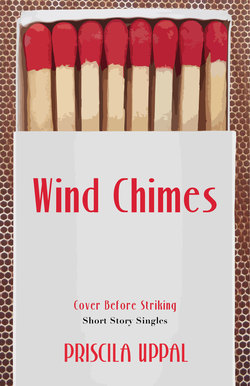Читать книгу Wind Chimes - Priscila Uppal - Страница 6
Wind Chimes
ОглавлениеMy father, my uncle and I, and two cousins who still lived in town, one nephew barely a man, carried the coffin down the main road to the Anglican graveyard. The plain oak casket, void of wreaths save a white rosebud cluster on each end, seemed too light on my shoulders. Though she wasn’t a heavy woman, she trod on the ground as if she were, and I fought back the urge to check inside the closed hatch to make sure she was actually dead. That night I woke my wife in tears and told her my mother was trapped, suffocating with stray cats and little boys twisted in car crashes — all buried alive, and I was supposed to be among them. A fever of 102 degrees, my wife informed me later. I shook as if caught in a bitter wind.
Though my mother wasn’t an Anglican, she’d remarked frequently on the beauty of the dark iron gate and the white oaks sheltering the local Anglican church’s graveyard, so my father thought it would be the best resting place for her. But she belonged to a different religion and was a congregation of one before I was born and became her disciple. She collected wind chimes. Dozens of wind chimes hung along the eavestroughs of our roof, clanging against each other. Some stayed up all year and some, frequently depending on colour, were reserved for particular seasons: rich orange and bright yellow for autumn, metals like steel or silver for winter, mauves and blues for spring, and whites or pinks for summer. The chimes all had secret hidden names, my mother claimed, names she couldn’t divulge to me out of respect, though I often asked her and she seemed pleased, tousling my hair or pinching my side playfully, when I tried to guess, offering up everything from Sally and Larry to Honey-Eyes or Acorn-Breath or Bee-Beauty. If you listen, she said, they will sing to you. You will understand. My mother believed death was twofold. “Two tunes for each soul,” she instructed. “One is for us and one is for the dead. Only they can hear that one.” The wind chimes’ songs filled me with a distant, unreachable ache, bearable only because she was beside me, my head in her lap on the porch.
Dead was a word I could understand, since I could spell it and use it in conversation. Uncle Billy is dead. Grandma Barnes and Great-Aunt Elisabeth are dead. But the first death I ever witnessed was the death of our dog. The collie, a stray that had latched on to our family before I was born, had no official name, just “Girl.” My mother said we didn’t need to name her, or put her on a leash. “Just as she was free to come, she must be free to leave.” Secretly, I called her Raisin, because she loved to eat raisins from my hands. When she got hit by the truck, I was astonished at how quick death was, how ordinary.
I watched my father from the driveway, a large man who moved slowly, kicking grey pebbles onto the street, the line between the beginning of the road and the place of death, a line of black tar I refused to cross. Raisin had been split open from her neck down to her tail by the impact of the front wheels. Her fur was matted with blood, her nose crushed to the point of disappearance. Incisors sliced through her cheeks. The trail of blood testified she had travelled several feet. She was worse than lifeless to me; she was shameful, punctured with tar and dirt, a damp banana peel, probably from the truck’s wheels, smashed across her stomach. Her body smelled like rotten milk. I counted three legs. Father scraped her up with a shovel into a trash bag, and carried her into Corner’s Field, a mile west from our home. I hoped the neighbours weren’t watching.
A silent man in general, my father’s silence during this affair was typical, unlike my mother, who could be heard wherever you happened to be in the house, humming and making rhythms with her hands on tabletops or feet on foot boards, swinging pots and pans, or ringing the small gold antique bell in the living room that she inherited from Great-Aunt Elisabeth. For my father, you walked with the dead only for the purpose of burying them. You kept your hands out of the matter after that.
